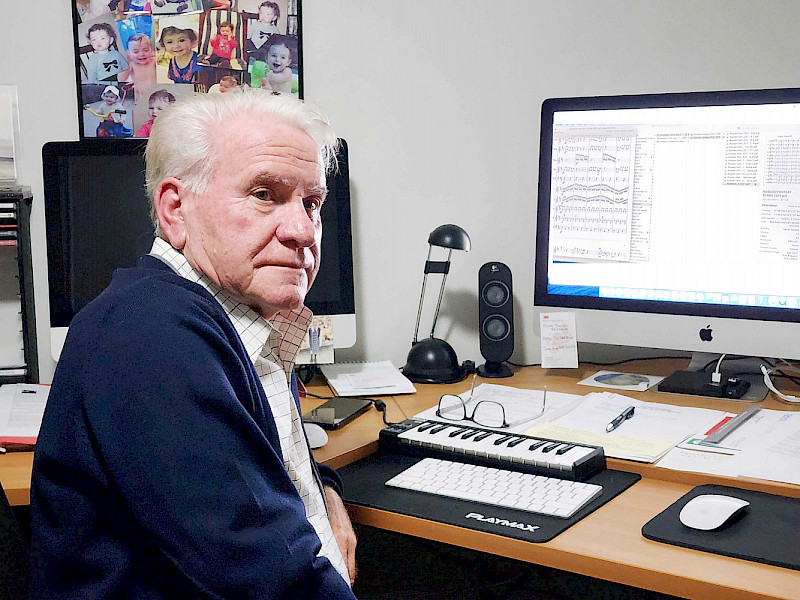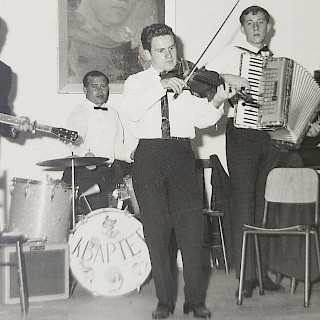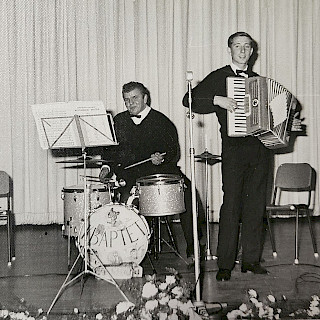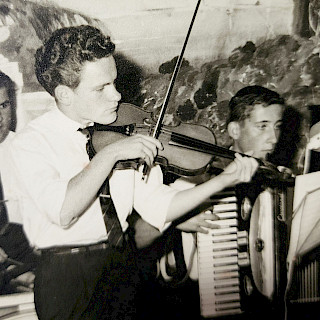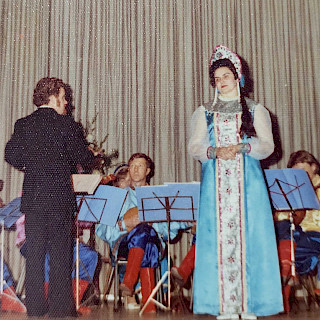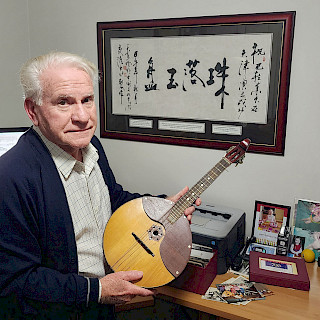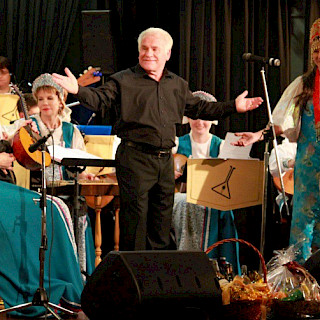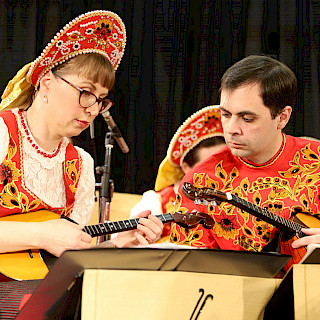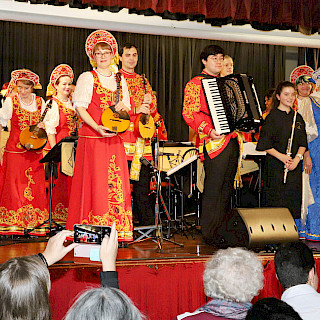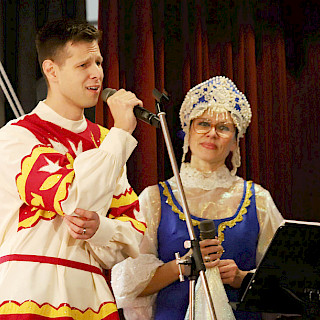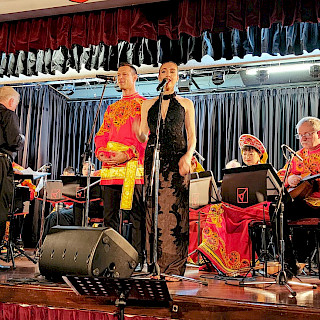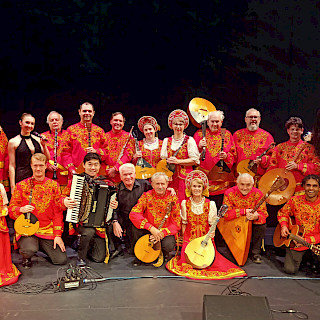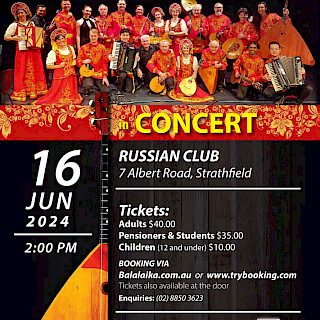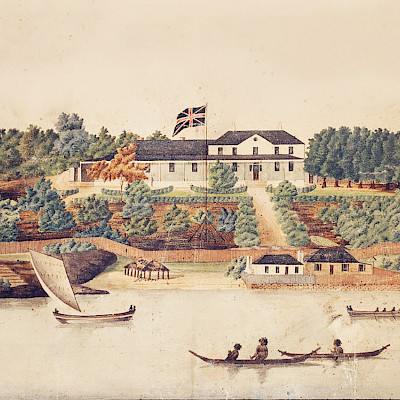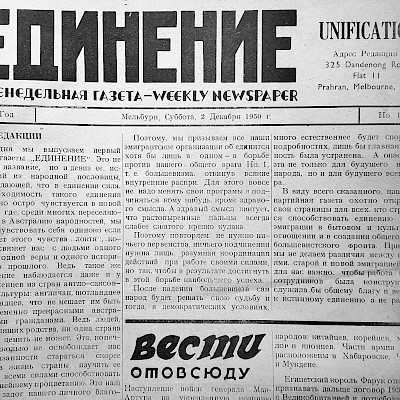Among the musical associations of our Russian community in Australia, the Sydney Balalaika Orchestra under the direction of Victor Serghie occupies a special, unique place.
There is perhaps no other group that, uniting people of different nationalities, passionate about Russian music, has performed on large Australian stages for more than half a century, made more than 10 successful foreign tours, including Russia, China and New Zealand, and recorded six music discs.
For over 50 years, more than a hundred talented musicians and singers have performed in this folk-instrument orchestra, replacing each other. But the director and conductor of the orchestra remained unchanged, a man who managed to rally music lovers around him and make participation in the orchestra exciting. And this was doubly difficult, since the musicians are volunteers without receiving money for it. A man who created arrangements of many famous songs and melodies, making them sound in a new way. Spectators never get bored at Balalaika performances - it’s professional, it’s beautiful, it’s fun.
When we learned that Victor Serghie who will soon celebrate his 80th birthday, plans to retire from the orchestra this year, we decided to talk with him and remember how the orchestra, loved by many, began, what kept people in the group, with a number of elderly members having to travel to rehearsals from distant suburbs of our huge Sydney.
But first we asked Victor to tell us how his musical career began.
— It began, I must say, from an early age. I was born in Harbin (China), where my parents came from different places: my father from Romania, and my mother from the city of Verhneuralsk (Russia). My parents wanted to give me and my two older brothers a musical education. My brothers studied piano, and at the age of six I was sent to study violin at a music school. Education received was of high standard and at the age of 9, I was already performing as a soloist in the school orchestra.
In 1956, when I was almost 10 years old, the family moved to Australia, where I continued my education, both school and musical. I studied violin with an excellent teacher, Vladimir Trakhtenberg, also from Harbin. Later I continued my violin studies with teachers at the Sydney Conservatorium of Music.
I realised that you couldn’t make a living from music alone, so at the age of 17 I began my apprenticeship as an instrument maker with a large Sydney company. After receiving my diploma, I had the opportunity to work in different departments of that company as a draftsman, designer and commercial manager. And retired after 39 years of employment.
— How did your musical career develop?
— During that time, I became interested in jazz and Latin American music. I mastered playing the saxophone and created a music group with other young guys from my circle. We performed in different clubs, in restaurants, and at numerous weddings of people from our community in those years. Our group “The Blue Quartet” consisted of Volodya Nojin, Nikolai Smagin, Alyosha Tetushkin and myself.
When the Russian Club moved into its own building in Strathfield, the youth had a very active social life there, with concerts and dance evenings once a week. The then Club Manager, Mikhail Churkin, asked us to perform at a dance party for young people on Sunday. Soon dance evenings were held three times a week, and those who wanted to attend had to book in advance. And we performed at the club for ten years.
— How did you turn to folk music?
— You could say it happened by accident. As I recall, in 1973, a concert of the Russian women's choir was to take place at the Lithuanian Club Strathfield. I remember that Nina Levitskaya, the current vice-president of the Russian Club, and her sister Tatyana sang in the choir. A small group of folk instruments performed with them under the leadership of Vladimir Mikhailovich Savitsky, an emigrant from Harbin.
Two weeks before the concert, choirmaster Lyudmila Priklonskaya fell ill. The women's choir was then very popular in our society, and almost all the tickets, and there were about 600 seats in the hall, were sold. My brother, who played in the orchestra, asked me if I could help to prepare the choir and orchestra for the concert.
At first, I didn’t know where to start, I had never performed with a choir, but I decided to give it a try. The concert was very successful. I must say, the harmony of Russian music, really interested me. I bought a domra, learned to play and joined this group of Russian folk music lovers. Since then, my main interest was primarily in Russian music.
The group gradually grew, attracting musicians and singers. We performed at different venues in Sydney and also traveled out of town. A quarter of a century ago, the group incorporated under a name of “The Sydney Balalaika Orchestra”. The word “Balalaika”, understandable to the whole world.
— It’s surprising that in your orchestra, which performs mainly Russian music, only a few people speak Russian.
— Currently, out of 22 members of the orchestra, only four speak Russian. The others, belong to ten different nationalities: Serbs and Ukrainians, Irish, Chinese, Indians, Malays, Armenians, Danes and Australians. The age of the orchestra members is also varied - from 15 to 79 years.
We have a Commitee in the orchestra that handles financial, advertising and organisational affairs. The funds collected go towards instruments, costumes, and subsidise different performance trips.
At one time there were 28 people in the orchestra. Some leave for various reasons: families move, girls get married, others cannot find time for weekly rehearsals. But new musicians are joining. Often people approach us after attending our concerts and ask if they can join us. Most of them are amateurs; at rehearsals we offer them an instrument of their choice and teach them. Not everyone is prepared to perform without payment. Also, there are people in the orchestra who have excellent musical education. Among them is Tatyana Jephtha a domra soloist, who came from Voronezh (Russia) 27 years ago and has been performing with the orchestra for 15 years.
In interview for our newspaper Tanya once said: “When I arrived in Sydney and came to the Balalaika concert, I was surprised at the wonderful sound of the orchestra, professional performance, and rich repertoire. And when I started performing with the orchestra, I got to know the people better and was pleasantly surprised again - orchestra members were very friendly, like one family.”
Accordionist Richard She came to us as a 13-year-old teenager and, one might say, grew up in the orchestra; he was born in Australia, his parents are from China. For several years in a row, he has won interregional accordion competitions.
— Solo singers also perform with the orchestra. Many people remember Sophia Markovtseva, who performed with the orchestra for more than 15 years.
— Sophia has a beautiful voice and an amazing ability to express the depth and beauty of Russian music. Today vocalists Dmitry Kuevda and Natasha Tatarinoff perform with the orchestra; they add new accents to the program, and the audience has already fallen in love with the talented performers.
— Balalaika performs not only for Russian-speaking audiences.
— Yes, most of the concerts take place on Australian stages. You could also hear our music on ABC radio. It’s nice that even in a difficult situation today, Australians fill the halls and warmly welcome Russian music.
We try to return kindness for kindness. After the devastating earthquake in New Zealand, our orchestra travelled to Christchurch to give two charity concerts, all proceeds from which were directed to help the affected residents.
— How were your concerts in Russia?
— In July 2005, our first trip to Russia and Harbin took place. Alla and Igor Savitsky opened the way for us; thanks for their help, our orchestra became known abroad.
When we went to Russia for the first time, we were worried how the Russians, where so many excellent orchestras play Russian music, would react to our performance. I remember we performed in Khabarovsk in a huge hall. After the first song there was silence in the hall, after the second there was isolated applause, then the concert continued amid thunderous applause and shouts of “Well done.” At the end of the concert there were endless questions from the audience.
Concerts were held in a similar environment in the Far East, in Blagoveshchensk, St. Petersburg and Moscow. More than a thousand spectators listened and greeted us in Tsaritsyno Park. It was especially pleasing for us to perform to Russian audiences.
— You were born in China, it must have been nice to perform in Harbin?
— We were greeted very warmly by the public and our hosts when the bus arrived at our hotel, they rolled out a red carpet for us. We also performed in Beijing and Tianjin.
— I see your wife Mila at all concerts, she sells tickets and CDs.
— Mila does a lot of work, and not only at concerts, but also many invisible but important duties. Mila has a good eye for detail and this is important when she checks and sends out our orchestra’s regular magazine.
— How did the orchestra react to the news that you plan to retire?
— This was unexpected for many. But as the years go by, I am 79 years old, the time has come for a new generation to take responsibility. And I will help them whenever possible.
— Victor, once you chose your path, you have been associated with the orchestra and Russian folk music for more than 50 years. Can we say that you are a happy person?
— I consider myself lucky, life was very interesting during these years. The main reason was constant encounter with music, arrangements for the orchestra, communication with people. Of course, there is a lot of work, a lot of nervous tension, but all this is forgotten when the audience call for an encore. I am very happy for the guys; they understand that their work was not in vain.
More information about Sydney Balalaika Orchestra www.balalaika.com.au
Recorded by Vladimir KOUZMIN
And some words from members of Orchestra
Alex Chao (accordion player): Thank you Victor for your devotion over the years. Your musical direction has greatly lifted the standards of folk music orchestras in Australia, and made SBO one of the best Russian folk orchestras in the world. I appreciate your guidance to allow me to enjoy Russian music to a whole new level. Wish you all the best.
Matt Morgan, prima domra player: "Victor's leadership and guidance have changed my life. He pushed us all to musical heights we could never have dreamed of otherwise. He is also very funny."
Millie Sergie: “We all take different paths in life, but no matter where we go, we will take a little of each other everywhere.”
Yuri Halay, balalaika bas player: Thank you Victor for the opportunity to develop an appreciation of playing Russian music. Your encouragement and support has been greatly appreciated. You truly will be missed. Yuri.
Andrew Smith, former SBO president and former Alto domra player of many years: “Often, when I practice, I can hear Victor’s voice telling me how to play it properly and to put the music into it. I learned a lot from the Orchestra. I’m really unable to explain how much I owe Victor. “
Olga Keenan (our newest balalaika prima player): I first met Victor Serghie a year ago in June 2023 when I joined the Sydney Balalaika Orchestra. I remember contacting him through the site, and writing a few questions about the possible opportunity to join. I was surprised when ‘quick as a flash’, I received a response from Victor.
He said “Yes, you are very welcome to join us”.
I said “But I don’t even play well enough”.
Victor's answer was “This is not about how we play, this is about how we love, what we are doing”.
And this year I have been ‘On Top of the World’ because the same day I did rehearsal with Sydney Balalaika Orchestra under the direction of Victor.
I have tried to find the words to describe what Victor’s role has meant to me. ´Lové - Not enough, ‘Talented’- Not enough, ‘Energetic?, Tireless ?, Brilliant ? All of them?
I Just heard a word uttered by Victor during a rehearsal when he said , ‘Please play it MAJESTIC - how it is...‘ One example of this is an old, popular Russian folk song called ‘Valenki’. In Victor’s hands and soul, this simple tune was transformed into a really Majestic, memorable performance. For me, it was the best rendition that I had ever heard! The same was also true for so many other pieces, that in the hands of Victor were transformed into something truly Majestic.
Today, Victor is starting on another page of his life I wish Victor, Milla and their family many years ahead, filled with brilliant, joyful moments, good health and happiness.
I feel however, that we, the orchestra members, still have much to do. We must continue to bring the energy and dedication to music that Victor has given to us, to the Australian community. We must introduce our fabulous music to people from all walks of life to enjoy and pass on to future generations.
We need to "Polishing the diamond"!
Thank you Victor for your inspiration. You, Victor Dmitrievich Serghie are MAJESTIC!



